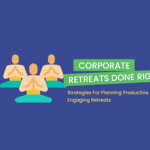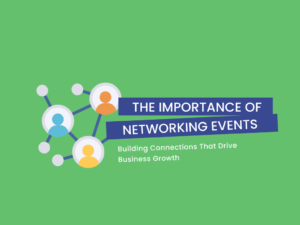
Are you thinking of planning a kickass event for your company that will inspire and renew their enthusiasm, but need to know where to start? Whether it’s a conference, team-building retreat, or company anniversary celebration, proper planning is the key to success.
This blog will share the ultimate guide for planning your corporate events. But even after reading our detailed guide, you may want to work with a professional event planner who will allow you to focus on the big picture and let someone else handle the nitty-gritty details.
What is a Corporate Event?
Corporate events refer to private events sponsored and held by companies or corporations for their employees, clients, or stakeholders. They can cater to a large audience, such as conferences and conventions, or a small audience, like retreats, private concerts, and holiday parties. A company can organize a corporate event for various reasons, such as:
- Educating their Employees or Clients
- Motivating Employees
- Celebrating Company Milestones
- Encouraging Team Collaboration and Networking
Best Tips to Plan a Successful Corporate Event:
- Clarity of Goals & Objective:
It is crucial to clarify what the company wants to achieve by hosting the corporate event. For example, is your company aiming to boost team morale, foster better communication, or showcase your brand’s values? This clarity will provide a roadmap to make informed decisions easily during the event planning process.
- Know Your Audience:
The audience can either make or break an event’s success. Figure out if they are laid-back people who love a good happy hour. Or are they more buttoned-up and prefer structured activities? Factors such as age, industry, job roles, and cultural backgrounds must also be considered to customize the event to their needs and expectations.
- Budget Wisely:
We know how much everyone detests thinking about the budget because our elaborate plans can come crashing down if they don’t fit into the company’s budget. However, budgeting early and wisely will help you avoid this issue. First, determine how much the company will spend overall, then break it into categories like venue, catering, entertainment, and decoration. Always, always leave a little room for unexpected expenses!
- Choose a Memorable Theme:
Add some flair to your event by choosing a killer theme that reflects your company culture or the event’s purpose. Choose a theme that resonates with your audience and sets the tone for a memorable experience.
- Pick a Suitable Venue:
Location, location, location! When choosing a venue for your corporate event, consider whether it complements your event format and theme. Are you going for sophisticated and elegant or laid-back and fun? Factors such as availability, size, capacity, and venue location should also be considered.
- Plan Engaging Activities:
No one will care about the dècor or the picturesque venue if your event is a snooze-fest. Make sure to plan activities that get the audience pumped up and involved. Think team-building exercises, hands-on workshops, or maybe even a friendly game of corporate bingo!
- Send Effective Invites:
Since your invite is the first impression of your event, put some creativity and thought into it. Consider details of your event (such as the theme or branding) or make it gorgeous and include all the vital information (date, time, location, RSVP details—whatever you might need). If it’s a digital invite or an email invite, make it stand out. Or choose to be gorgeous and fancy and go for paper.
- Have One Source of Information:
With several individuals organizing a corporate event, it’s important to establish a centralized hub where everyone can access vital information. This could mean using the planner’s system, our internal one, or creating a shared space that anyone can access. As D-Day gets closer, a lot of details will need to be double-checked, and this shared space will be of huge help.
- Prepare for the Unexpected:
“Anything that can go wrong will go wrong.” Murphy’s Law rings true in any sort of event planning. No matter how much we plan and prepare, the event will run into some hiccups. Always have a contingency plan for emergencies like bad weather, electricity outages, technical glitches, etc. It is imperative to stay calm and flexible in such situations.
- Collect Feedback After Event:
The real work begins after the event is wrapped up smoothly. It is important to collect feedback from your audience after the event. This can be done immediately after the event in the venue itself or later by sending emails thanking them for attending and asking for their feedback via surveys. You can offer rewards such as gift cards or a chance to meet and greet with the keynote speaker to encourage participation.
- Leave the Hassle to the Professionals:
All of the above sounds overwhelming, doesn’t it? But don’t worry; hiring professional event planners will solve your problems jiffy! They have years of experience, connections, and the ability to pay attention to every small detail. Professional event planners can ensure your event is a roaring success while staying within the budget.
As we all know, planning the ultimate corporate event is no small feat, but using these tips and tricks from CorpCrew can transform it into a powerful tool for business growth and employee engagement.
If you’re ready to hire a corporate event planner for your event, fill out this form to get in touch.







No comment yet, add your voice below!